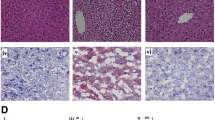Abstract
Hepatitis C virus (HCV) core protein plays an important role in the development of hepatic steatosis in patients with chronic HCV infection. Treatment of C57BL/6 mice infected with HCV core recombinant adenoviruses with resveratrol significantly decreased hepatic triacylglycerols (TAG) while the serum TAG level was unaffected. RT-PCR and Western blotting showed that HCV core protein attenuated the expression of Sirt1 and PPAR-α, which would be reversed by resveratrol. This was also confirmed in primary mouse hepatic cells infected with HCV core protein expressing adenovirus. Thus, resveratrol may prevent against hepatic steatosis by blocking the inhibited expression of Sirt1 and PPAR-α induced by HCV core protein.



Similar content being viewed by others
References
Barba G, Harper F, Harada T et al (1997) Hepatitis C virus core protein shows a cytoplasmic localization and associates to cellular lipid storage droplets. Proc Natl Acad Sci USA 94:1200–1205
Baur JA, Pearson KJ, Price NL et al (2006) Resveratrol improves health and survival of mice on a high-calorie diet. Nature 444:337–342
Bordone L, Guarente L (2005) Calorie restriction, SIRT1 and metabolism: understanding longevity. Nat Rev Mol Cell Biol 6:298–305
Borra MT, Smith BC, Denu JM (2005) Mechanism of human SIRT1 activation by resveratrol. J Biol Chem 280:17187–17195
Bujanda L, Hijona E, Larzabal M et al (2008) Resveratrol inhibits nonalcoholic fatty liver disease in rats. BMC Gastroenterol 8:40
Cohen HY, Miller C, Bitterman KJ et al (2004) Calorie restriction promotes mammalian cell survival by inducing the SIRT1 deacetylase. Science 305:390–392
Delladetsima JK, Rassidakis G, Tassopoulos NC, Papatheodoridis GV, Smyrnoff T, Vafiadis I (1996) Histopathology of chronic hepatitis C in relation to epidemiological factors. J Hepatol 24:27–32
Kasdallah-Grissa A, Mornagui B, Aouani E et al (2006) Protective effect of resveratrol on ethanol-induced lipid peroxidation in rats. Alcohol Alcohol 41:236–239
Lefkowitch JH, Schiff ER, Davis GL et al (1993) Pathological diagnosis of chronic hepatitis C: a multicenter comparative study with chronic hepatitis B. The Hepatitis Interventional Therapy Group. Gastroenterology 104:595–603
Lonardo A, Adinolfi LE, Loria P, Carulli N, Ruggiero G, Day CP (2004) Steatosis and hepatitis C virus: mechanisms and significance for hepatic and extrahepatic disease. Gastroenterology 126:586–597
Moriya K, Yotsuyanagi H, Shintani Y et al (1997) Hepatitis C virus core protein induces hepatic steatosis in transgenic mice. J Gen Virol 78(Pt 7):1527–1531
Nakamura M, Saito H, Ikeda M et al (2010) An antioxidant resveratrol significantly enhanced replication of hepatitis C virus. World J Gastroenterol 16:184–192
Tanaka N, Moriya K, Kiyosawa K, Koike K, Gonzalez FJ, Aoyama T (2008) PPARα activation is essential for HCV core protein–induced hepatic steatosis and hepatocellular carcinoma in mice. J Clin Invest 118:683–694
Ungvari Z, Orosz Z, Rivera A et al (2007) Resveratrol increases vascular oxidative stress resistance. Am J Physiol Heart Circ Physiol 292:H2417–H2424
Yamaguchi A, Tazuma S, Nishioka T et al (2005) Hepatitis C virus core protein modulates fatty acid metabolism and thereby causes lipid accumulation in the liver. Dig Dis Sci 50:1361–1371
Yilmaz O, Keser S, Tuzcu M, Cetintas B (2007) Resveratrol (trans-3,4′,5-trihydroxystilbene) decreases lipid peroxidation level and protects antioxidant capacity in sera and erythrocytes of old female Wistar rats induced by the kidney carcinogen potassium bromate. Environ Toxicol Pharmacol 24:79–85
Acknowledgments
This work was supported by Grants from National Natural Science Foundation of China (81170798 and 81000171).
Conflicts of interests
No conflicts of interest are involved in this manuscript
Author information
Authors and Affiliations
Corresponding author
Additional information
Lina Jiang and Yu Gu contributed equally to this study.
Rights and permissions
About this article
Cite this article
Jiang, L., Gu, Y., Ye, J. et al. Resveratrol prevents hepatic steatosis induced by hepatitis C virus core protein. Biotechnol Lett 34, 2205–2212 (2012). https://doi.org/10.1007/s10529-012-1034-0
Received:
Accepted:
Published:
Issue Date:
DOI: https://doi.org/10.1007/s10529-012-1034-0




